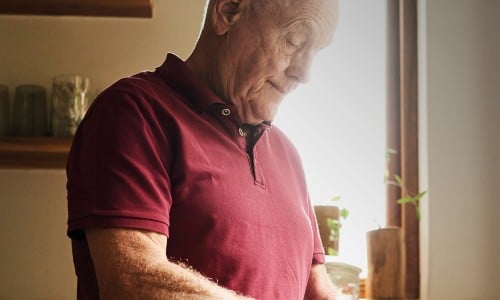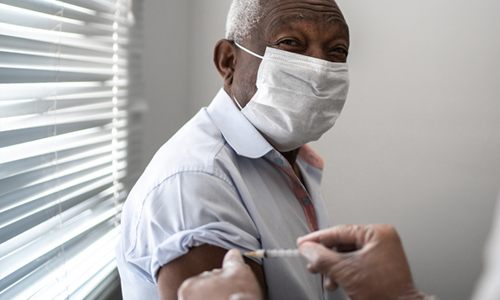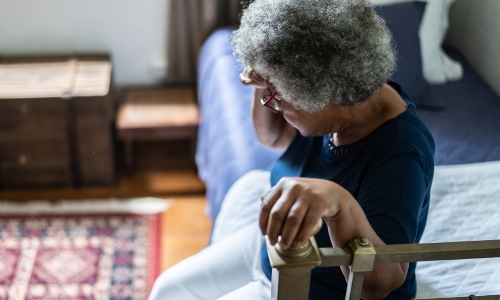Among its many effects, the outbreak of COVID-19 has brought healthcare requirements into sharper focus. Even before the emergence of the pandemic, however, Age UK was working to highlight the specific needs of groups within society, including older LGBT+ people and their experiences of care, and what can be done to improve those experiences.
Many older LGBT+ people have experienced lifetimes of persecution and prejudice. While the Equality Act of 2010 offers legislative protections for non-heterosexual and non-binary people, and progress has been made, experiences of discrimination, past and present, can directly impact health. It can exacerbate mental and physical health issues, making LGBT+ people more likely to engage in unhealthy behaviours and habits, such as excessive alcohol consumption and drug use. And as LGBT+ people grow older, there’s an extra level of complexity to the issues they face, an intersection between sexuality/gender identity and age.
I was comfort eating, and I ate to excess and that damaged me physically. My pancreas has practically packed in.
The healthcare needs of older LGBT+ people
There is limited evidence on the health and care needs and outcomes for older LGBT+ people, however analysis of evidence that does exist suggests that there are health inequalities between older LGBT+ people and the rest of the older population. For example, non-heterosexual men aged 50+ have lower life satisfaction and are more likely to have attempted suicide in their lifetime, and non-heterosexual women aged 50+ are more likely to smoke. Evidence also suggests that there is a higher prevalence of mental health in older LGBT+ people.
Furthermore, there is evidence that some older LGBT+ people have worse experiences of accessing healthcare than their peers. In a recent Government survey of LGBT+ people of all ages, 16% had a negative experience while accessing (or trying to access) public health services. Meanwhile, at least 38% had a negative experience because of their gender identity. Poor experiences of health services can lead to people delaying treatment and in turn lead to worse health outcomes.
Norm, 63, is bisexual. He came out in 2011, having kept his sexual orientation a secret from his family, who subsequently ostracised him, leading to a complicated series of issues. “The main problem I had when I came out was the mental health — depression,” explains Norm. “I was comfort eating, and I ate to excess and that damaged me physically. My pancreas has practically packed in.”
Norm continues: “Because of my diabetes… I lost my job. That made me even more depressed.”
Transphobia and healthcare
At present, there’s little UK research focusing on the health needs of older transgender adults. A US study, however, has found that transgender older people were at higher risk of poor physical health, disability and depression when compared to cisgender respondents [people whose personal identity and gender corresponds to their birth sex].
Pauline, 71, a trans woman from Manchester, has shared her experiences with us. “My perception of the LGBT community is that everybody in it, to some extent, has mental health issues,” she says. “Although society is more tolerant of us than they were, and gay people probably got the first look at that, everybody I know has either been discriminated against or treated badly in all kinds of different ways.”
There were two nurses… and they were saying some hideous things about me as a trans person.
Helen, from West Yorkshire, who describes herself as “very old”, has had direct experiences of transphobia, including within the NHS, having been misgendered and the subject of hate speech. “There were two nurses… and they were saying some hideous things about me as a trans person,” she explains. “I didn’t make a complaint. I didn’t want to get them into trouble.”
This has made Helen worry about the future. “I’m getting older and obviously think about long-term care and even though I’ve got a partner, how long is she going to be able to look after [me]. Say I’d had [a] stroke or something, the fear of going into a care home or nursing home with staff like [those] I was telling you about fills me full of dread. And that is a really ongoing worry for me.”
Pauline has similar fears about needing care. “One of my fears is ending up in an old people’s home and having to be a man all the time. I hope that I die before I ever get into a care home.”
Concerns about care
Most of the older LGBT+ people Age UK has spoken to expressed confidence the NHS would meet their future needs — even those, like Helen, who have encountered discrimination while accessing healthcare. It’s complicated, though, by the fact that research shows that fear of discrimination and previous experiences of prejudice still remains an impediment to people seeking healthcare services.
This fear was much more significant when it comes to accessing social care services. People expressed a few reasons for this. First and foremost, with coverage of the underfunding and resourcing of the social care system in the press, many people will worry that the care system will be unable to meet their needs. This would be particularly problematic for those who would worry that a lack of care provision may result in the need for informal care from family members who have not accepted their sexuality or gender or without support completely from friends and family leaving people reliant on limited state support.
Additionally, there is an understanding that care services are potentially more frequent and have greater levels of intimacy than those provided by NHS and that this may interact more closely with their day to day lives and so their gender identities and sexual orientation. A professional working with LGBT+ older people has told us: “People hide their magazines, they take their pictures off the wall, because they don’t know who’s going to turn up.”
There were also high levels of concern about the people delivering these services, who may come from socially conservative countries and therefore hold homophobic and transphobic views.
The experiences of LGBT+ people with dementia
Everyone worries about what would happen to them if they were to be diagnosed with dementia. But what of LGBT+ people who fear their advocacy and identity will be neglected when they receive care? Dementia naturally results in distress and confusion, but this may be exacerbated in LGBT+ people with dementia who may struggle to deal with negative perceptions of their sexuality or gender while in residential care or face issues when they are not able to advocate for themselves. An older transgender person experiencing cognitive decline, for example, may forget who they have come out to, or indeed that they have transitioned.
David and Elmar, who live in London, have been together for 14 years. Elmar, who is 20 years older than David, has Alzheimer’s disease, and their experiences of healthcare have so far been positive, something they put down to London being a place of greater acceptance. The two men don’t access care services yet, though the possibility of it is something that David has some concerns about.
Thinking about care homes, it’s difficult because the people who are employed there may not be so tolerant.
“I think we’re lucky that Elmar’s got me to look after him,” explains David. “Thinking about care homes, it’s difficult because the people who are employed there may not be so tolerant. For example, there may be people of different religions, who don’t accept gay people or people who don’t have the contact with gay people as well, so they just don’t understand their needs.”
These are worries that David, who found coming to terms with his sexual orientation challenging, considers when he thinks ahead to when he’s one day alone. “In care I’d prefer it to be specialist. You never know if you’re in a home which is mixed. You never know if you’ll get negative people.”
There's more to be done
These insights help to build a picture of the health and care experiences and requirements of older LGBT+ people but are by no means the full picture. It’s also worth remembering that some of the stories we have shared have come from individuals confident enough to be interviewed and participate in research. But what of those whose experiences have been so unsettling and so damaging that individuals not only distrust health and social care services but are uncomfortable coming forward to discuss these issues?
It’s also important to note that it is not possible to generalise the needs of all older LGBT+ people, but understanding individuals needs and histories and what that might mean for their health and care needs will be key to delivering true personalised care and ensuring the reduction in health inequalities faced by older LGBT+ people.
Our research has also discovered good practice and examples from throughout the health and care sector to better support older LGBT+ people, but there is still room for further considerations and more research, and this is something Age UK will continue to advocate for.






